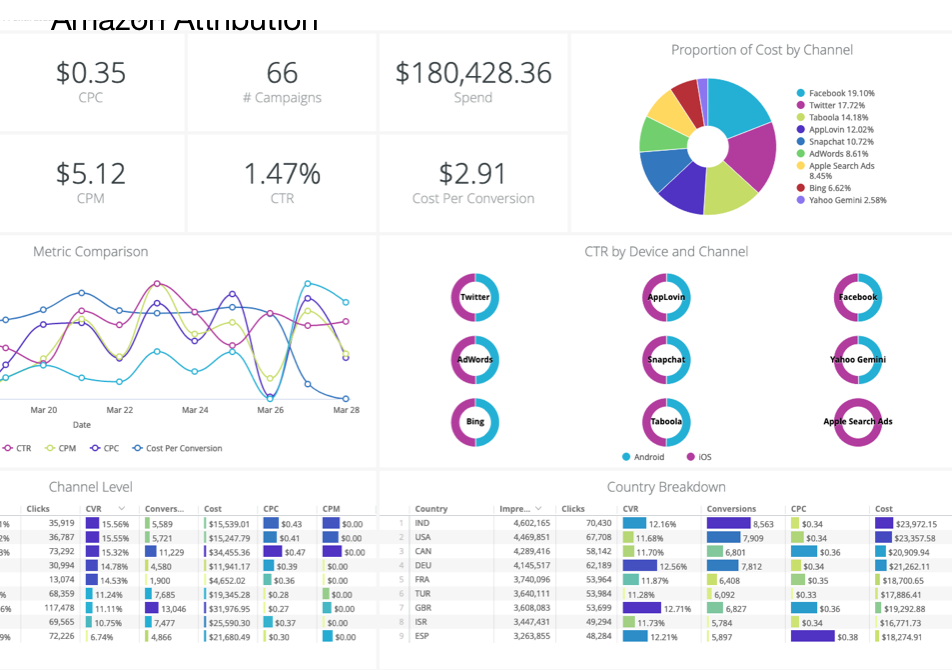
Which part of the marketing budget and sales funnel activities are driving profitable growth? Is there a specific marketing effort working to drive conversions on Amazon? Display, search, social, video, or email?
Amazon Attribution performance data helps answer how non Amazon channels are drive growth (or dragging it down).
Amazon Ads Attribution Amazon Attribution metrics
There are two core report classes;
- Promoted product analyze performance of products associated with your campaign. You can use this type of report to gauge how your campaigns impact shopping activity and sales for your products on Amazon.
- Brand halo analyze performance of the brand products you didn’t promote (also known as brand halo) with a daily or summary performance broken out by campaign, channel, and publisher. This daily view shows one row per campaign-channel-publisher combination per product per day.
These reports contain a collection of permformance metrics;
- Add to Cart: Number of times a promoted product is added to a customer’s cart following a click on an associated ad.
- Brand Halo: Tracks conversions on products by the same brand as the promoted products, excluding the promoted products themselves. Abbreviated as “BH.”
- Detail Page Views: Number of views of the advertised product’s detail pages on Amazon.
- New-to-Brand Purchases: Number of first-time purchases for promoted products within the brand over a one-year lookback window.
- New-to-Brand Product Sales: Total sales (in local currency) of new-to-brand orders.
- New-to-Brand Units Sold: Quantity of promoted products purchased for the first time within the brand over a one-year lookback period post-ad delivery.
- Product Sales: Total sales (in local currency) of promoted products purchased on Amazon post-click on an associated ad.
- Promoted Product: A product tracked by an Amazon Attribution campaign.
- Purchases: Number of times any amount of a promoted product or products are included in a purchase event.
- Total Purchases: Number of times any number of products are included in a purchase event, including promoted products and those from the same brand.
- Total Add to Carts: Number of times a product is added to a customer’s cart, including adds for promoted products and those from the same brand.
- Total Detail Page Views: Number of ad-attributed detail page views on Amazon, including views for promoted products and those from the same brand.
- Total Product Sales: Total sales (in local currency) of promoted products and those from the same brands as promoted products post-click on an associated ad.
- Total Units Sold: Total quantity of promoted products and those from the same brand as promoted products purchased post-click on an associated ad.
- Units Sold: Total quantity of promoted products purchased on Amazon post-ad exposure.
Amazon Ads Attribution Conversion metrics
You can also a number of conversion metrics designed to help you understand how shoppers engage with and make purchases on Amazon through the entire shopping journey.
Each Amazon Attribution conversion metric comes in two versions:
- Promoted conversions that include attributed conversions for the products associated with your campaign, and
- Total conversions that encompass attributed conversions for the products associated with your campaign plus all other products in the same brand. Total conversions equal promoted conversions plus brand halo conversions.
Each metric fits into a specific phase of the shopping journey so you can analyze the full-funnel impact of your non-Amazon marketing campaigns:
Awareness
Invest in growing the total audience of Amazon shoppers who are aware of your brand. Relevant Metric:
- Clicks
Consideration
Help maximize purchase intent by telling your brand and product story. Relevant Metrics:
- Detail Page Views
- Add to Carts
Purchase
Stay present when shoppers are ready to buy. Relevant Metrics:
- Purchases
- Sales
- Units Sold
Optimizing Off-Amazon Digital Marketing Campaigns with Amazon Attribution Data
What can this data offer advertisers? By exploring the rich performance data, teams can identify the most effective channels, publishers, creatives, and messaging strategies that drive customer engagement and conversions.
Strategic Testing: Uncovering Performance Drivers
An effective strategy to use once you have your data unified and ready to go is building an informed testing framework. This can be effective at uncovering the tactics that resonate with target audiences and maximize campaign delivery.
To optimize off-Amazon digital marketing efforts, consider conducting the following tests:
- Channel and Publisher Performance Analysis: Identify which channels and publishers are most effectively directing traffic to Amazon and contributing to sales. Focus on scaling efforts with high-performing partners.
- Creative and Messaging Resonance: Assess the effectiveness of various creatives and messaging approaches. Determine which combinations drive stronger engagement, conversions, and customer acquisition.
- High-Value Opportunity Identification: Utilize the products report to uncover potential advertising opportunities. For instance, if an ad for Product A leads to increased detail page views for Product B, consider creating a dedicated ad for Product B.
- Engaging Landing Page Experiences: Conduct landing page A/B tests to evaluate how shopping activities differ based on landing destinations and calls to action. Test different Store page tabs, product detail pages, and CTAs to optimize customer engagement.
- Unique Audience Insights: Identify the tactics that best engage specific audience segments across non-Amazon channels. Use these insights to allocate resources and tailor messaging more effectively.
Accessing Attribution Performance Data
You can access your Amazon Attribution manually via the reporting dashboard or as automated data feed from the Amazon Ads API.
Using the API allows you to create customized, multi-dimensional, visual reporting dashboards in industry leading tools like Looker Data Studio, Tableau, Microsoft Power BI, Looker, or Amazon Quicksight where you can customize the metrics displayed and toggle between campaign and ad group data.

Amazon Attribution API Data Feeds
There are two primary report data feeds from the API
Performance Report
- Included Dimensions: aa_campaignid, aa_adgroupid, aa_creativeid, publisher.
- Aggregation Level: Can be aggregated at CAMPAIGN, ADGROUP, or CREATIVE level (default: CREATIVE).
- Metrics: Click-throughs and all Promoted and Total conversion metrics.
Products Report
- Included Dimensions: aa_campaignid, aa_adgroupid, publisher, productName, productGroup, productCategory, productSubcategory, brandName, productAsin, productConversionType.
- Aggregation Level: Always aggregated at ad group level.
- Metrics: Promoted and Brand halo conversion metrics, Brand Referral Bonus. No click-throughs.
Once attribution tags have been implemented and shoppers have clicked your links, Openbridge will call the report endpoint to retrieve your data. Clicks may take up to 24 hours to appear, and conversions may take up to 48 hours.
Getting Started with Amazon Ads Attribution API Automation
Ditch the messy, manual reporting for Amazon Attribution. Automated data feeds guide data-driven decision making to improve off-Amazon digital marketing campaigns. Leverage attribution insights to refine strategies, allocate resources efficiently, and enhance customer engagement across all touchpoints.
Openbridge will unify and deliver performance data to leading data lake or cloud warehouses like Redshift, Google BigQuery, Snowflake, Azure Data Lake, and Amazon Athena for an analytics-ready single source of truth to fuel informed decisions on brand building strategy, media, and customer demand for Amazon.
With your data unified, start to turbocharge reporting, analytics, and business intelligence tools like Google Data Studio, Tableau, Microsoft Power BI, Looker, Amazon QuickSight, SAP, Alteryx, dbt, Azure Data Factory, Qlik Sense, and many others.
Get a 30-day free trial so that you can try Amazon Attribution API automation for yourself
How Advertisers Can Use Amazon Attribution was originally published in Openbridge on Medium, where people are continuing the conversation by highlighting and responding to this story.
from Openbridge - Medium https://ift.tt/jdIJwet
via IFTTT